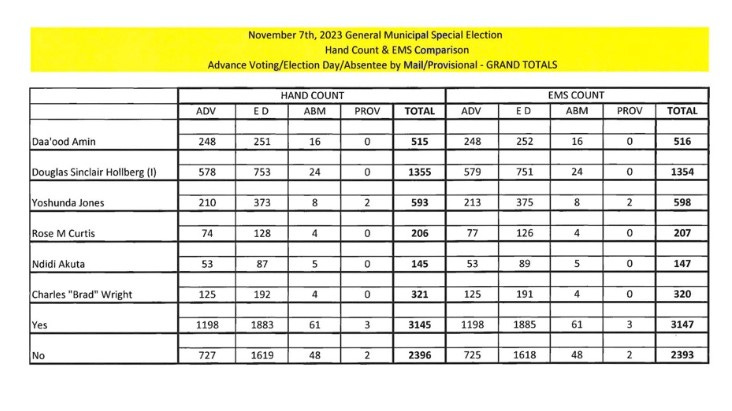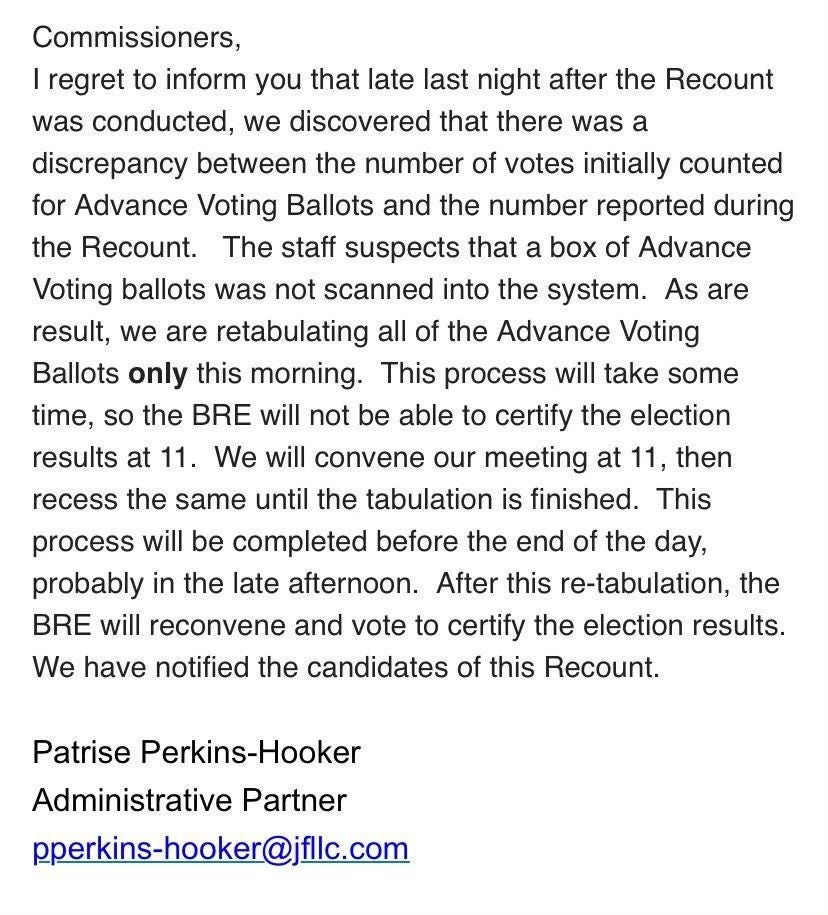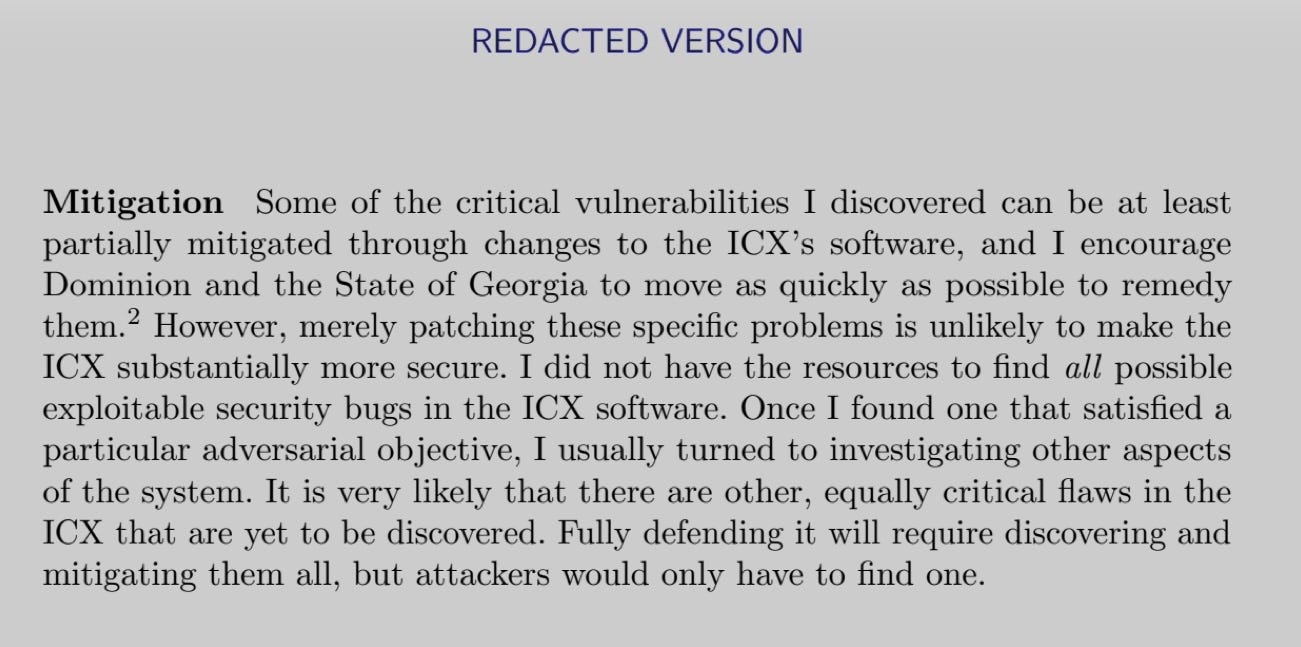The Devil is Still in Georgia
The Devil is Still in Georgia
Looking for a Soul to Steal. America's.
In November 2020, Sidney Powell spoke her infamous line, “Georgia's probably going to be the first state I'm going to blow up.” In the wake of the 2023 coordinated elections, Georgia indeed appears to be blowing up.
Or, maybe, imploding is a better word.
Earlier this week, Ms. Powell’s legal proffer in Fulton County, GA District Attorney Fani Willis’ laughable criminal proceeding against President Trump and co-defendants was leaked to ABC News. The disclosure reveals nothing new about the events in the aftermath of the 2020 election, but it does provide narrative shielding for the post election issues occurring in Georgia.
One has to wonder if the License to Lie author is bringing the Kraken after all.
Someone appears to be.
“Every Single Race in Every Single Precinct”
In Spalding County, late last week, the required post-election hand count from the November 7 municipal elections revealed that, according to sources observing the hand counts, in every race across every precinct, the hand count results did not match the machine counts.
On Friday, the Atlanta Journal & Constitution (AJC) attempted get ahead of the inevitable questions arising from the inexplicable outcome, in an article claiming:
“There were no signs of miscounts or voting machine errors in Spalding County... Still, deep distrust of Georgia’s voting machines drove the county election board to require a hand recount this week.”
There were known issues with the elections in Fulton County at the time, but to be generous to the AJC, you could argue then, on Friday, that they were unrelated to the machines. You can’t really argue that now, but more on that below.
Hand counts of the machines are required in Spalding County – and several other Georgia counties — and anecdotal reports from observers during the advanced vote hand count were explosive — with estimates of 100s or more ballot inaccuracies.
Unlike the advanced voting counts, hand counts of election day and absentee voting did not yield the same variances. That is, the discrepancies all relate to the advance voting – which is also true in Fulton County — an outcome that should generate heartburn for Scott Pressler and the rest of the right-side-uniparty who are irresponsibly pushing early voting on Republican voters.
While the initial, anecdotal reports were explosive, the official results following the hand count were not. While hundreds of discrepancies were thought to have occurred during the hand count, in the end, the certified results only showed a variance of nine votes, netting out to a five vote impact on the outcome.

Despite a push to delay certification to discover the root cause of the issues in Spalding, the county’s election board voted Tuesday morning to certify the result with a 2-1 vote. The lone holdout on certification was Board of Elections Secretary Roy McClain, who could not be reached for comment.
The county likely voted to certify because the discrepancies are small but, while these are immaterial variances, they do nothing to assuage the voter concerns about machine manipulation that led to the hand count in the first place.
In fact, the dismissive speculation and disinterest of elections officials does the opposite.
“I regret to inform you… there was a discrepancy…”
Fulton County, GA reported multiple issues in the November 7 election. According to a different AJC report — hilariously issued the same day that the outlet claimed, “There were no signs of miscounts or voting machine errors” — voters in East Point and Atlanta reported that they'd been issued incorrect ballots by the county. East Point and South Fulton also had issues with uploading voter information into the state’s electronic registration system.
As a result, the county issued a statement that, “The recount will be held to confirm the accuracy of the election results before election certification.”
Then, Tuesday morning, the county delayed certification due to an irreconcilable difference in vote totals following three successive counts.
In an email from the county’s “Administrative Partner” – law firm Johnson & Freeman, LLC – obtained from sources close to the matter on Tuesday, Patrise Perkins-Hooker told Fulton County Commissioners:
“I regret to inform you that late last night after the Recount was conducted, we discovered that there was a discrepancy between the number of votes initially counted for Advance Voting Ballots, and the number reported during the recount. The staff suspects that a box of Advance Voting ballots was not scanned into the system. As are [sic] result, we are retabulating all of the Advance Voting Ballots only this morning. This process will take some time, so the BRE will not be able to certify the results at 11.” (emphasis added)
Just like in Spalding county, the discrepancies arise from advanced voting only — early voting. As a reminder, Fulton County is the county where DA Willis is criminally prosecuting President Trump and others for not trusting elections.
The problem with the assertion made by the county Administrative Partner that “a box of Advance Voting ballots was not scanned into the system” is that, according to sources witnessing the recounts, the totals went down.
These sources, who requested to remain anonymous out of fear of retaliation, claim that the Fulton County count was off in three successive counts “based on the Voter History File.” From these sources, the first count was 13,705, the second was 13,690, and the Tuesday morning count that led to delay was 13,330.
It’s unclear why each count removed votes from the total but, in the final count, 375 votes were lost from the first reported total and 360 from the second.
Where did these votes go? Is voter disenfranchisement of hundreds of voters okay if it doesn’t impact the outcome?
Just the News reported the story Tuesday afternoon and quoted Perkins-Hooker confirming the 300 ballot variance:
"The recount will not delay our certification. We will be certifying the election in 45 minutes or so. The second recount was undertaken to verify the accuracy of the Advanced Voting ballots, which did not agree in the first recount with the election day totals. It was only 300 ballots off. This error was the result of a group of ballots in one box not being scanned in last night. The oversight was caught last night and today's recount was called."
The problem with this explanation is that, if additional ballots were found and scanned, the totals would be expected to go up, not down. To be clear, it appears Perkins-Hooker provided this statement to JTN before the third count — hence the wishful thinking that certification would not be delayed — but after Monday night’s second count, which did NOT show a 300 ballot variance according to the source. Curious.
Eventually, late Tuesday, Fulton County certified though they have not published final numbers to the county elections website.
“The Court cannot wave a magic wand…”
Earlier this week, we learned that Curling et al v. Raffensberger et al now has a trial date, with Judge Amy Totenberg scheduling the proceedings to begin on January 9, 2024. This case was brought by Democrats in 2017 regarding the use of voting technologies in the state, and it has since revealed serious vulnerabilities from noted cyber expert J. Alex Halderman.
Professor Halderman’s findings were released in June, after remaining under seal since July 2021, and Georgia election officials have refused to address and patch the known issues in advance of the 2024 election. For what it’s worth, Halderman is on record that patching won’t repair the vulnerabilities.
Still, the state doesn’t appear bothered by the vulnerabilities. Quoting from the AJC article above:
“Deputy Secretary of State Jordan Fuchs said the plaintiffs have never offered an election security solution that doesn’t include hand-marked paper ballots. The state has been fighting the lawsuit since 2017. ‘We don’t negotiate with election deniers,’ Fuchs said. ‘If they have an idea that wouldn’t take Georgia back to the days of hanging chads and stuffed ballot boxes, they should offer it.’”
Hanging chads were, of course, the big controversy during the 2000 Bush v. Gore contest that led to the Help America Vote Act – which gave rise to the current multi-billion dollar election industry, black box voting equipment, and a convergence of public and private election administration. Also, stuffed ballot boxes are our current reality, so it’s unclear what Ms. Fuchs is thinking.
Is Fuchs truly afraid of hand marked paper ballots, or is she otherwise invested in the status quo?
It’s also important to note that the devices under scrutiny in Curling are used across the state, including in Fulton and Spalding Counties.
“The Court cannot wave a magic wand in this case to address the varied challenges to our democracy and election system in recent years, including those presented in this case,” Judge Totenberg wrote. “But reasonable, timely discussion and compromise in this case, coupled with prompt, informed legislative action, might certainly make a difference that benefits the parties and the public.”
"What happens if we show that Trump won?"
On Tuesday’s Why We Vote, CannCon and I interviewed Harrison Floyd, a defendant in the Fulton County criminal proceeding against President Trump et al. Floyd is the former Executive Director of Black Voices for Trump, and is responsible for expanding President Trump’s support among black voters to unprecedented levels in 2020.
The inception of his involvement in the case is due to a mainstream news article that misrepresented his involvement in GA’s elections, and Willis looped him into the criminal proceedings based on that reporting. Unlike any other defendant in the case, Floyd was denied bond and held due to “the fact that” Floyd was “a flight risk.” They did not explain what made him a flight risk.
Floyd has vowed to prove his actions in the wake of the election were based on the belief that Trump won the election, and his lawyers have argued as much before the judge during a hearing on the state’s motion to quash subpoenas in the case on November 3:
Judge: “Let’s say there is some smoking gun locked away in a vault in the Secretary of State’s office, that Mr. Floyd had no idea it ever existed … how is that relevant?”
Floyd’s Attorney: “It’s relevant for two reasons…At the time, if he believed Trump won, and the State is saying, ‘No, Trump lost,’ but at the time he believed Trump won, and it turns out that we find evidence that Trump won, he may have been justified in what he did. But that’s a tenuous argument… We have numerous references to the election being lost by Donald Trump. In fact, in the introduction, the State says that, ‘Not only did Trump lose Georgia, but he and the other defendants charged refuse to accept that Trump lost.’ What happens if we show that Trump won?”
It’s noteworthy that the Secretary of State has since withdrawn the motion, leaving DA Willis out on a limb.
On Monday, the proffer videos of Jenna Ellis and Sidney Powell were leaked to ABC News, and DA Willis, according to NPR, is blaming Floyd’s team for the leaks and demanding a protective order on evidence in the case. Floyd denies the allegations, and the leaks are curious given the delayed 2023 certification in Fulton County, and the fact that Willis is attending a fundraising dinner in Washington, D.C. on Wednesday.
The protective order would also limit public visibility to exculpatory evidence — which Floyd’s attorneys argued in the same hearing:
“The reason they don’t want to turn it over is because, I submit Judge, that a lot of the stuff we’ve asked for, they simply don’t have. And they don’t want to tell you.”
Read CannCon’s extended thread with full videos here.
Floyd has vowed to fight all the way to the Supreme Court, if necessary.
“We’re going to hold these bastards accountable.”
-Harrison Floyd
Can we restore public trust in US elections without public trust in Georgia’s elections?
The devil went down to Georgia in 2020, and he was looking for a nation’s soul to steal. Given the current state of affairs in the Peach State, it appears he stayed and made himself at home.
Thankfully, Georgians are fighting back, and his days are numbered.
The official answer to the 2023 election variances — which may be more widespread, but will only be discovered by those who look — will, as always, be that it was simple human error, and that the discrepancies were immaterial to the outcomes.
But transparency in the process drives trust in the outcome and, given the myriad issues with Georgia’s election system, voters have a right to understand the actual cause rather than endure dismissive speculation.
Kristin Nabers, Georgia state director for All Voting Is Local, who, according to AJC, observed the counting – and, thus, the advanced voting discrepancies – is already pushing the tired “human error” line and attacking Georgia voters who desire transparency in the process.
Speaking to the AJC, Nabers stated:
“I see hand counts as part of a push by bad-faith actors to spread lies and conspiracy theories. Discrepancies are to be expected because of human error, but any discrepancy, no matter how small, could be used to cast doubt on the counting process.”
In other words, discrepancies should be ignored so that people don’t question elections. Fortunately for voters, and unfortunately for Nabers, that is not how public trust works.
According to Holly Kesler, Georgia State Director for Citizens Defending Freedom, "The 2023 voting results prove that Georgia can no longer afford to use voting machines.”
Indeed.
In my opinion, three counts resulting in different totals should never be dismissed — and it would not be dismissed in any other industry or audit practice. Anyone who has worked retail has needed to balance the drawer to the penny.
Isn’t “our democracy” more important than retail?
Transparency drives trust and, election outcomes aside, Georgia voters deserve a transparent process. Institutional public trust is at an all time low, with 68%+ of voters most concerned about public corruption (NY Times, October 2022), and more than half of voters — 57%+ — distrusting our elections (Rasmussen, November 2022).
Add to the ongoing GA election issues that there is escalating lawfare against those who dare to question the state; then add the weaponized use of criminal proceedings against political opponents, and you will quickly realize that public trust won’t return without transparency, without believable answers, and, now, without much needed accountability.
Against this backdrop, the same tired excuses, dismissive speculation, and condescension towards voters will no longer suffice.
The people of Georgia must evict the devil now.
Source: Badlands Media



Comments
Post a Comment